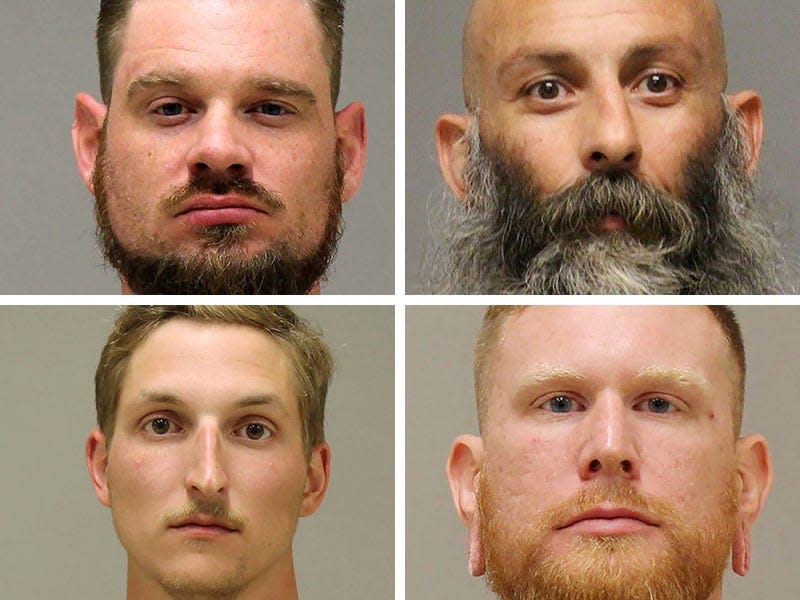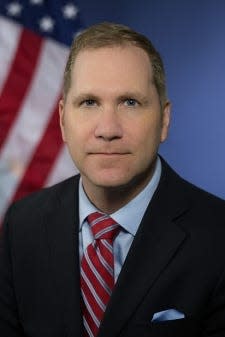Former federal prosecutors assess Whitmer kidnap plot case. Do they agree?

- Oops!Something went wrong.Please try again later.
Four former federal prosecutors from the U.S. Attorney's Office in Detroit are weighing in on the Gov. Gretchen Whitmer kidnap plot trial in Grand Rapids, where deliberations will head into day three on Wednesday.
Three believe the government has a strong case. One does not.
The lone dissenter isn't convinced the suspects were really intent on pulling the kidnapping off, while the three others believe that they were, and that the government proved so by showing actions that the suspects allegedly took to carry out the kidnapping.
These alleged actions include: casing Whitmer's vacation house twice, building a shoot-house that looked like the governor's cottage, drawing up a map of her property, trying to order explosives, inspecting the underneath of a bridge to place those explosives, communicating on encrypted chats so not to get caught, and buying night vision goggles, according to trial testimony.
"It sounds like the evidence is powerful — the shoot house, the surveillance trips, the attempted purchase of explosives," said former U.S. Attorney Barbara McQuade, who is not sold on the defense claims that the defendants were entrapped and too unsophisticated to pull this off.
"The defenses of incompetence or entrapment did not seem to be supported by the evidence," said McQuade, who also believes that one of the defendants may have hurt himself by testifying.
That was 24-year-old Daniel Harris of Lake Orion, who during his testimony called an undercover informant whom he once trusted and admired "a b----."
Harris, who at times was combative and defiant on the stand, insulted the informant for getting offended by a violent meme.
"He got scared by memes," Harris explained before further mocking the informant. "You went to Iraq, came out hurt, but words hurt you, words scare you? ... You’re a b----. Words are words."
McQuade believes that Harris' testimony bodes well for the prosecution.
Is this normal?: Jury deliberations head into day 3 in Whitmer kidnap plot case
More: Whitmer kidnap plot jury asks another question. Judge says figure it out.
"The jury was no doubt interested in hearing his side of the story, and his testimony sounded ineffective," McQuade said. "Using an expletive against another witness seems unlikely to garner sympathy from the jury."
Former Assistant U.S. Attorney Michael Bullotta believes that Harris probably turned jurors off with his testimony, though he doesn't think the jury will convict him or the others of kidnapping conspiracy.
"I would not be surprised if everyone is acquitted on count one," Bullotta said, referring to the kidnapping conspiracy, calling it a "really tough charge to prove."
Bullotta, who is now a criminal defense attorney after working 23 years as a prosecutor, isn't convinced the group had a "real plan" to kidnap Whitmer.
"If they had a real plan, where they said, 'This is the day. We’re going to do it. Stuff is coming in on Thursday,' and everyone showed up – that would be different," Bullotta said.
But Bullotta said he didn't see that kind of planning by the group, only a "loose idea" that was thrown around, with no real sense of it building up to an actual event.
"They're just practicing," Bullotta said of the military exercises and shoot-house trainings the group allegedly held in various states. "I don’t really know the cadence. But if it’s building up to an event, that’s more compelling to me."
Bullotta said he didn't see that.
"It wasn't a real plan," Bullotta said. "If they had a real date, a calendar date — that seems like a real plan, not when they are just a bunch of yahoos blowing up (stuff). It's a tough one."
At issue for the jury, Bullotta said, will be answering this key question: Were they really going to do it?
"They loved the idea of it. They hated the governor. And they had their jollies getting their emotions on," Bullotta said. "But were they really going to do it?"
But Mark Chutkow, who with Bullotta successfully prosecuted former Detroit Mayor Kwame Kilpatrick in the historic 2013 public corruption case, is convinced.
"I think the government has a compelling case," Chutkow said of the Whitmer case. "The overt acts in furtherance of the conspiracy is what makes the case more compelling."
Chutkow also questioned the defense's entrapment claims, particularly when the lawyers argued at closing that the FBI hatched the kidnap plot and set the defendants up to advance their own careers.
"That's a high-stakes strategy to claim that the FBI agents were making up the whole plot to advance their careers," Chutkow said. "That requires the jurors to believe that the real criminals in this case were the agents, not the defendants."
Chutkow also touched on the defense's claims that this case was all about puffery, big talkers engaged in tough talk and blowing off steam.
"A safer defense would be to argue that the agents misinterpreted the defendants' words — mistakenly thinking that the defendants intended to go through with the plot rather than merely blowing off steam with tough talk," Chutkow said. "We'll see if that argument resonates with the jury."
Former U.S. Attorney Matthew Schneider, who replaced McQuade in 2020, also believes the government has a strong case.
"What I think is unusual is that both sides have told the jury the same theory," Schneider said. "They have both said, 'Don’t judge a book by its cover.' "

The defense, he said, said things like, "Look, my client might use nasty language. He might not be a very nice person. But those are words, not action."
"But the prosecution has said the same thing. 'You don't have to judge them from the outside. Open the book and look at their actions,'" said Schneider, stressing the actions of the defendants are "critical" in this case.
They inspected a bridge, cased her house, tried to collect money from the group for a bomb, he said.
"Those are actions," Schneider said, disputing the defense's claims that this was all just talk. "They're saying it’s only words — but it really wasn’t, there were actions … I don’t think there’s any doubt about that fact."
'You guys are our last chance': Fox's lawyer urges Whitmer kidnap plot jury to acquitAs for the defense's claims that it was an FBI agent who suggested casing Whitmer's house, or going to the bridge to inspect it for a good spot to set explosives, Schneider said: "No one says, 'Hey, what are we doing here. Let’s get out of here.' ... They could have said, 'Turn around,' or 'Stay in the car.' That didn’t happen."
All four prosecutors interviewed for this story worked at the U.S. Attorney's Office in Detroit during the 2012 failed Hutaree militia prosecution, though they did not argue that case. It involved allegations that nine members of a self-described Christian militia group plotted to overthrow the government by killing a police officer and bombing the subsequent funeral with the hopes of sparking a larger uprising.
More: Key differences between Whitmer kidnap trial, and the failed Hutaree case
A judge dismissed the case in almost its entirety in the middle of trial and set the defendants free, concluding the government hadn't proven its case, and that it was only talk.

McQuade has long defended the Hutaree case, maintaining agents had to dismantle the group because they believed it was on the brink of carrying out a violent attack.
"Imagine on the day before he blew up the federal building in Oklahoma City, we caught Timothy McVeigh with a truckload of fuel and fertilizer and you had him on tape saying he was going to blow up the federal building. Do you wait until he strikes the match? Do you wait until he blows up the building? I say no," McQuade said at the time.
Ten years later, McQuade still holds to that philosophy, though she does see a difference between the Hutaree and Whitmer cases.
"The biggest difference between that case and this one is the improved public awareness — that when people plot to attack government officials, we should take it seriously," McQuade said.
One of the defense attorneys who worked on the Hutaree case, Mike Rataj, sees some similarities between the Whitmer and Hutaree cases — mainly that they both relied on the work of rogue FBI informants, he said.
But there is a key difference, Rataj noted.
"One of the biggest distinguishing characteristics in that trial versus our trial is it appears that the defendants took some steps to carry out their plan," Rataj said of the kidnap plot suspects. "In our case, all it was was just a bunch of people playing army and talking a lot of smack around the campfire."
Contact Tresa Baldas: tbaldas@freepress.com
This article originally appeared on Detroit Free Press: Former federal prosecutors assess Whitmer kidnap plot: Do they agree?

